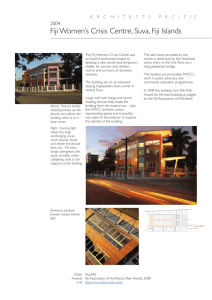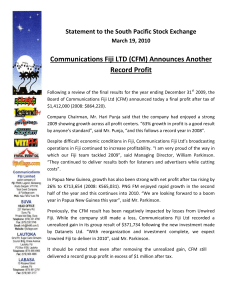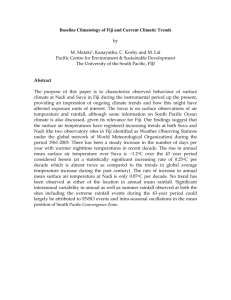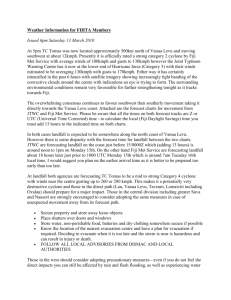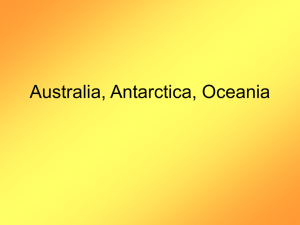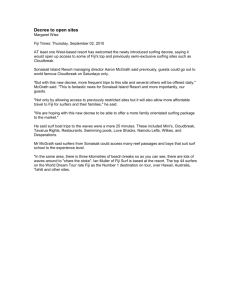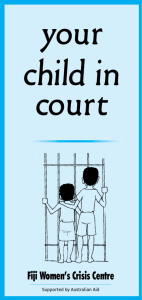Fiji Islands Additional Service Providers Additional Information
advertisement
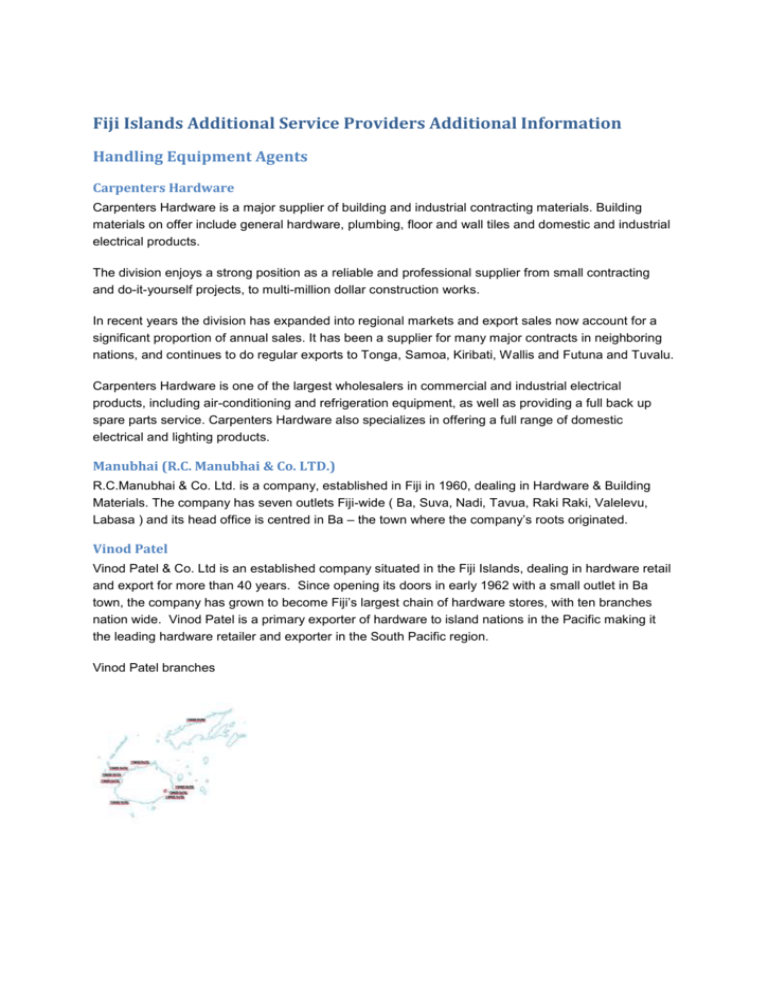
Fiji Islands Additional Service Providers Additional Information Handling Equipment Agents Carpenters Hardware Carpenters Hardware is a major supplier of building and industrial contracting materials. Building materials on offer include general hardware, plumbing, floor and wall tiles and domestic and industrial electrical products. The division enjoys a strong position as a reliable and professional supplier from small contracting and do-it-yourself projects, to multi-million dollar construction works. In recent years the division has expanded into regional markets and export sales now account for a significant proportion of annual sales. It has been a supplier for many major contracts in neighboring nations, and continues to do regular exports to Tonga, Samoa, Kiribati, Wallis and Futuna and Tuvalu. Carpenters Hardware is one of the largest wholesalers in commercial and industrial electrical products, including air-conditioning and refrigeration equipment, as well as providing a full back up spare parts service. Carpenters Hardware also specializes in offering a full range of domestic electrical and lighting products. Manubhai (R.C. Manubhai & Co. LTD.) R.C.Manubhai & Co. Ltd. is a company, established in Fiji in 1960, dealing in Hardware & Building Materials. The company has seven outlets Fiji-wide ( Ba, Suva, Nadi, Tavua, Raki Raki, Valelevu, Labasa ) and its head office is centred in Ba – the town where the company’s roots originated. Vinod Patel Vinod Patel & Co. Ltd is an established company situated in the Fiji Islands, dealing in hardware retail and export for more than 40 years. Since opening its doors in early 1962 with a small outlet in Ba town, the company has grown to become Fiji’s largest chain of hardware stores, with ten branches nation wide. Vinod Patel is a primary exporter of hardware to island nations in the Pacific making it the leading hardware retailer and exporter in the South Pacific region. Vinod Patel branches Electricity and Power Electricity Generation The FEA operates mainly through a hydropower-based Viti-Levu-Interconnected-System (VLIS) and the isolated Rakiraki diesel system in Viti Levu. In Vanua Levu are two isolated systems: Labasa and Savusavu. In Ovalau is a diesel system to cover needs of Levuka. Presently, the FEA includes a relatively small 10 kW PV array connected to the VLIS at the Navutu Depot in Lautoka. In addition to the major Wailoa (Monasavu Dam) 80 MW hydropower system, there is a 0.8 MW hydropower plant in Waineqeu (Savusavu, Vanua Levu). The FEA also purchases electricity, for the VLIS and Labasa grids, generated by the Fiji Sugar Corporation (FSC) using bagasse. Capacity Concerns Electricity demand in Fiji has been growing at 5% yearly over the last five years, and is expected to continue to grow faster in the coming years. The FEA, however, faces a challenging uncertainty in terms of future load growth and the performance of their future capacity investments, which are directly influenced by the uncertain direction of Fiji’s economy. Also, the value of Fiji’s imports has been increasing and reached the US$3 billion mark in 2006. A major contributing factor to this increase has been the importation of mineral fuel, which has increased in value from around US$400 million in 2004 to about US$1.2 billion in 2008. The heavy dependence of industry on imported fuel highlights the vulnerability of the economy to rising fuel prices. This is of particular concern considering that the increase in demand for power over the last decade has exceeded the Monasavu Hydropower Station capacity, and resulted in the FEA supplementing its energy capacity with diesel generation. In terms of final energy consumption, the transport sector has continually consumed over 40% of the total energy supplied, followed by the commercial sector, industrial and domestic sector. Production Units Type Installed Capacity (MW) Hydro-electric 62.1 % Diesel 33.8% Wind 0.6 % IPP Installions (Various) 3.5% Current Production (MW) Imported Electricity Details The total reliance on imported fuel has been an obstacle to Fiji's development. Nearly half of Fiji's total energy is imported from Australia, New Zealand and Singapore. Australia and New Zealand were the major suppliers of petroleum products in the country. Mineral oil imports in 2008 totalled US$692.8 million, accounting for 33.9% of Fiji’s total national import bill. The transport sector is the main consumer of commercial fuel, mostly in the form of gasoline. Distribution The FEA has an extensive grid system on Viti Levu, and three smaller grids on Vanua Levu and Ovalau. Vanua Levu, the second largest island, has no widespread electricity grid, partly due to the high cost of diesel generation and sparsely spread population of the entire area. The Savusavu grid is powered by an 800kW hydro scheme and a 1.04 MW diesel plant. 87% of the total number of urban households had access to electricity in 2002, and about 49% of rural households are electrified. It is estimated that about 57% of Fiji's total population have direct access to power supplied by the FEA. Supply Electricity The supply of electricity to consumers in Fiji is split into that supplied by the Fiji Electricity Authority (FEA) and that supplied to rural consumers by the Public Works Department (PWD), operating small power grids at five provincial centres. The former is by far the largest, accounting for all major grid areas in the main islands. The FEA is a state-owned organisation, with the monopoly on the transmission and distribution of electricity via the national grid, and is a vertically-integrated organisation. Power Stability Power grid / network coverage 87% of the total number of urban households had access to electricity in 2002, and about 49% of rural households are electrified Is supply regular and constant No, especially during storms and floods. Furthermore, in remote throughout the country? rural areas, electricity supply is still a challenge On average, how often does 1 per month power supply go out? On average, how long does the 30 min – 1 hour outage last? Internet Service Providers Internet Services provided by Connect (a subsidiary of Telecom Fiji Limited), Kidanet (subsidiary company of Fiji International Telecommunications Ltd), Unwired Fiji, Vodafone Fiji Ltd and Digicel offer Internet access to individuals with 'Individual Dialup' and 'Home User' packages. Casual access is also available at business bureaus and Internet cafes. For more information, please visit the following websites: 1. http://www.connect.com.fj 2. http://www.kidanet.com.fj 3. http://www.unwired.com.fj 4. http://www.vodafone.com.fj 5. http://www.digicelfiji.com Corporate Access Corporate connections allow an organization to have Internet access via a single link with Internet Services. Internet access is then distributed to individual users over a network or the link may be used by a single person. Corporate Access options provide 24-hour connectivity and allow organizations to manage their own email accounts, web sites and other services. ISP Providers Companies Connect Connect is a fully owned subsidiary company of Telecom Fiji Limited under Amalgamated Telecom Holdings. Connect Fiji Ltd. began in 1996 with the exclusive license to provide internet services throughout Fiji. Kidanet @Home: KIDANET’s Internet services for home users range from 128k to 1MB access plans. @Work: KIDANET provides two types of access services for business clients; dedicated and shared. @School: KIDANET is about connecting schools and students. Dedicated and shared service packages for educational institutions are available Unwired Unwired Fiji is a private Fijian registered company offering full internet services. Unwired Fiji is the first true wireless broadband internet service in Fiji. Network deployment from 2005 to 2007 saw Unwired expand the first Pre-Wimax in the Pacific. The shareholders in the company include: Hari Punja and Sons Limited Data Nets Limited Communications Fiji Limited Kontiki Growth Fund Limited Vodafone Vodafone works closely with Vodafone Group to provide support and solutions that are tailored for every individual offering a seamless local and international experience bundled with an abundance of strong, growing services. Vodafone has got 350 base stations
